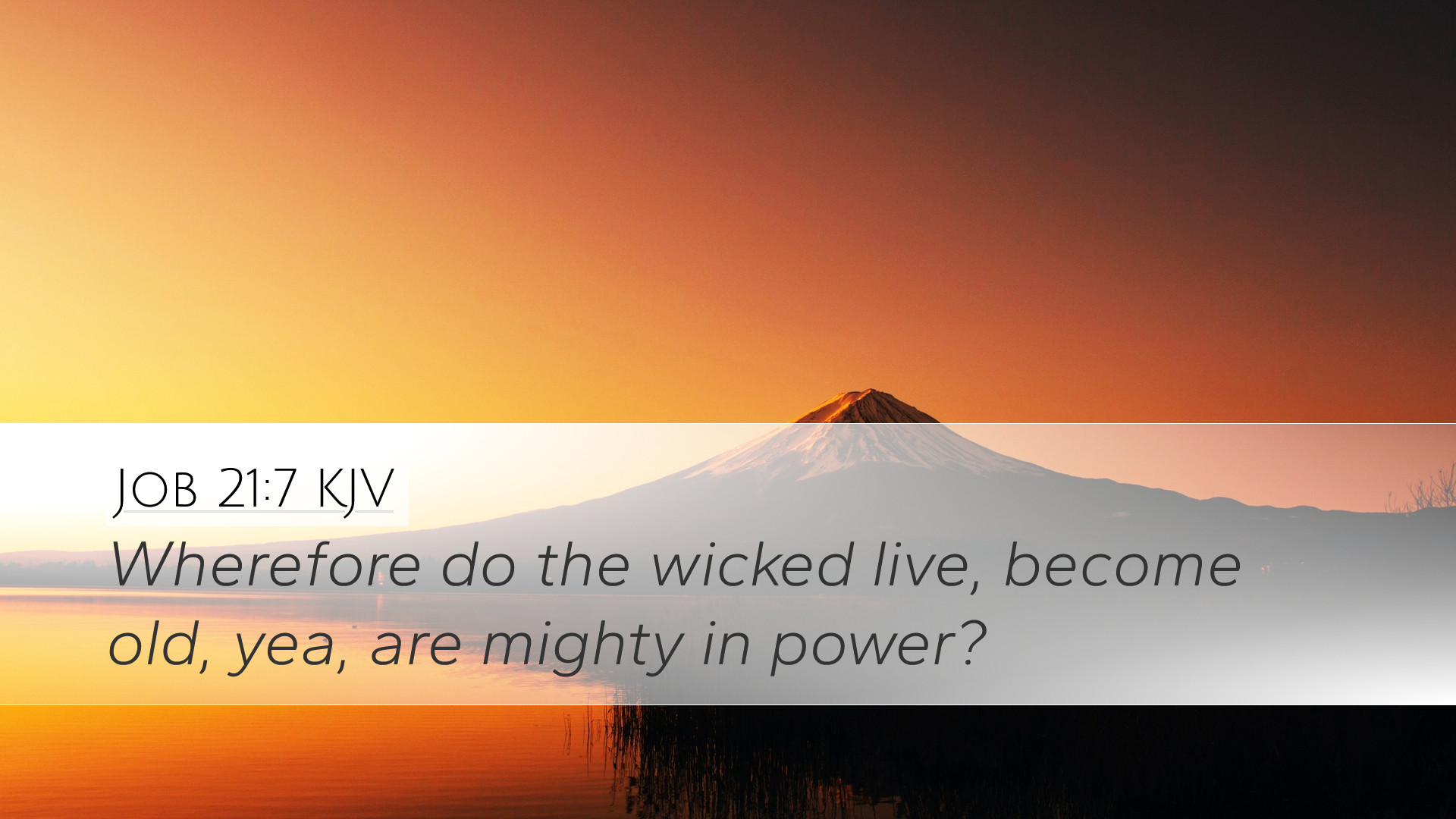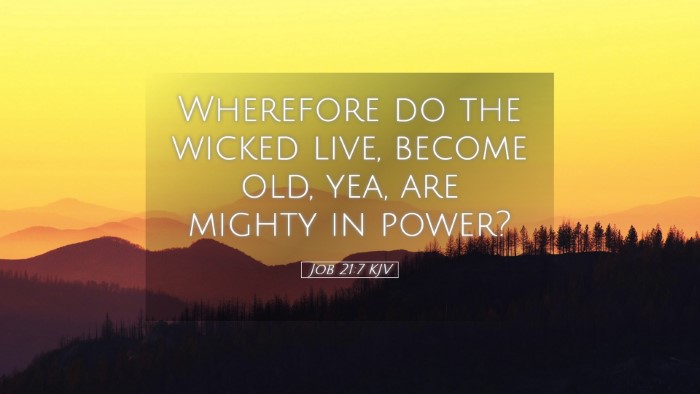Commentary on Job 21:7
Job 21:7 states: "Why do the wicked live, become old, yea, are mighty in power?" This verse encapsulates the profound existential questions that arise in the face of apparent injustice in the world. Job’s inquiry highlights the struggle to reconcile the existence of evil and suffering with the belief in a just and sovereign God.
Contextual Overview
Job’s questions are provoked by his undeserved suffering, contrasting sharply with the apparent prosperity of the wicked. Throughout the Book of Job, the main theme revolves around theodicy—the justification of God’s goodness given the presence of evil. Job here articulates a raw, honest frustration that resonates deeply with human experience.
Insights from Matthew Henry
Matthew Henry emphasizes that Job's inquiry reflects a common human struggle: why do those who live in opposition to God often seem to thrive? Henry posits that God’s timing and judgments differ significantly from human expectations. He notes:
- Ecclesiastical Silence: The apparent prosperity of the wicked does not signify God’s approval. Often, those who flourish in unrepentance are operating outside of immediate divine retribution.
- Temporal vs. Eternal Perspective: Henry encourages readers to consider the ultimate judgment of God, suggesting that while the wicked may prosper temporally, eternal consequences await.
- The Nature of God’s Justice: He argues that God’s justice may not be valued or discerned in the realm of human reasoning, and that patience is required in faith.
Insights from Albert Barnes
Albert Barnes brings a keen analytical and theological approach to this verse. He suggests that Job’s rhetorical question serves multiple purposes:
- Affirmation of Reality: Barnes acknowledges that Job’s statement serves both as a lament and an assertion of observable truth—many wicked individuals do live long and prosperous lives.
- Challenge to His Friends: This question essentially challenges the worldview of Job’s companions, who insist that suffering is a direct result of sin. Job’s insistence on the contrary exposes their flawed theology.
- Universal Experience: Barnes understands Job’s indignation as a recognition of a universal human experience, thus inviting readers to grapple with the complexities of life that defy simple moral categorization.
Insights from Adam Clarke
Adam Clarke brings a scholarly perspective that delves into the sociocultural implications of Job’s arguments. He notes:
- Human Observation: Clarke explains that Job’s observations are a reflection of the experiential knowledge of humanity; the good often suffer while the wicked flourish.
- Philosophical Inquiry: He highlights that Job’s question embodies an essential philosophical inquiry into the nature of justice and suffering.
- God’s Purpose: Clarke speculates that the long-term purpose of God often lies beyond human comprehension, urging humility in addressing divine sovereignty.
Theological Implications
Job 21:7 challenges key theological doctrines, such as:
- The Sovereignty of God: While God is all-powerful, His ways and timings often defy human logic, reminding believers that divine wisdom is supreme.
- Human Suffering: The verse flashes a stark reminder of the reality of suffering and evil in the world, compelling Christians to cling to faith amidst confusion.
- Virtuous Living: Though Job reflects on the prosperity of the wicked, it prompts an examination of the value of virtuous living in the face of worldly success.
Practical Applications for Believers
Reflecting on Job 21:7, one can draw several applications:
- Lamentation and Honesty: Job’s openness in questioning God can encourage believers to be honest in their struggles rather than resorting to silent suffering.
- Faith in Justice: This verse serves as a reminder that while prosperity does not indicate righteousness, God’s ultimate justice will prevail.
- Engagement with Suffering: Job’s inquiry invites believers to grapple with their own experiences of suffering and injustice, fostering empathy and compassion.
Conclusion
Job 21:7 encapsulates the complex interplay of faith, suffering, and the prosperity of the wicked. Through the insights of Matthew Henry, Albert Barnes, and Adam Clarke, we see that this verse invites deep reflection on God's justice and the realities of the human condition. For pastors, students, and theologians alike, it serves as an essential reminder of the importance of faith amidst life’s uncertainties and the need for patience as we await God’s ultimate resolution.


